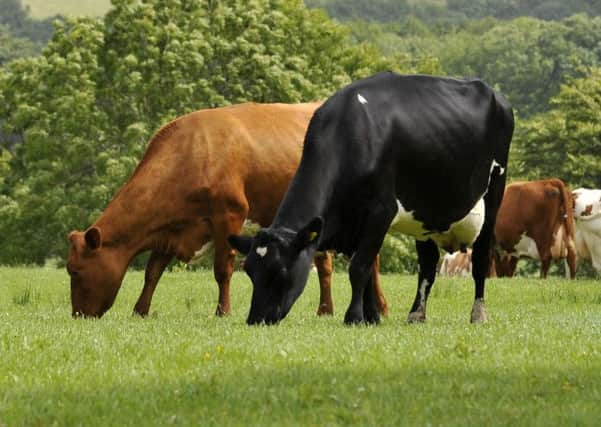Anne McIntosh: EU reforms must work to benefit UK farmers


From the sheep on the hills and the calves being fattened in the Vale of York, to the auction marts in Thirsk and Malton, agriculture plays a key role in our rural economy.
This is what we do and do well in North Yorkshire. Our livestock production ensures a safe and secure source of food while providing jobs and income on the hill farms. It is crucial that the policy-makers in Westminster make sure agriculture receives the support it requires.
Advertisement
Hide AdAdvertisement
Hide AdThis is an uncertain time for farming. European leaders last year agreed a package of reforms to the Common Agricultural Policy. The reforms will take effect next January, but such is the flexibility in the agreement it is not yet clear how farmers will be affected.
A key part of the new CAP is the introduction of “greening”. From 2015, around 30 per cent of the payments will depend on farmers satisfying a number of green measures. Governments have discretion to stick with measures put forward by the EU or go further and make them more stringent. Time and again, we see the Government “goldplating” EU regulations to the detriment of businesses. I am pleased therefore that this Government has chosen to adhere as closely as possible to the measures.
It is unfortunate, however, that the flexibility afforded to Member States to implement the new CAP does not extend to offering green measures that are an alternative to the impractical crop diversification. The Government must urge the European Commission to reconsider this measure at the earliest opportunity. The decision on what crops to grow must be one for the farmer and dictated by the market not by some arbitrary rule from Brussels.
The reforms also include an active farmer test. The Government must use the active farmer test to make sure that any EU subsidy goes only to people who actually and actively run a farm business, shoulder entrepreneurial risk and are in day-to-day management control of the land they farm.
Advertisement
Hide AdAdvertisement
Hide AdIt is disappointing that the Government wishes to reduce by initially 12 per cent the amount of money that could be available to our farmers.
This is the rate at which the Government wants to transfer funds from the budget which provides direct support to farmers and into the budget for rural development.
Compare this rate with Italy which will not transfer out any funds and France which will transfer just two per cent.
Also, the rate in Scotland will be 9.5 per cent and that poses a clear discrepancy between North Yorkshire farmers and their Scottish counterparts.
Advertisement
Hide AdAdvertisement
Hide AdA larger direct payment budget means farmers can invest more in their operations allowing them to increase their productivity and resilience. Cutting payments to farmers may leave them more vulnerable to shocks such as poor weather and price volatility. I am sure we all remember the heavy snowfall of last winter and its dire consequences for hill farmers.
It is no surprise that the latest report on average farm business incomes shows that over the last year farm incomes fell across most farm types as the effects of the unfavourable weather, high input costs and the pound strengthening against the euro were felt across the cropping and livestock sectors.
English agriculture has faced many challenges over the last decade from outbreaks of devastating animal diseases, falling farm-gate prices and rising input costs, to the vagaries of weather that has delivered drought, flooding and heavy snowfall. English farmers number among the proudest workers of any industry. It is clear that they would rather do without CAP payments, but the simple truth is that most would not be able to survive constant shocks without them.
Farmers know from bitter past experience that the development of the new IT system will be a major challenge for the Government. A lot went wrong in the last round of changes at the Rural Payments Agency and these problems gave rise to massive penalties. With that in mind, it is questionable if it makes sense to introduce a new computer system at the same time as complex new payment rules. Forcing people to engage digitally when they might well lack adequate broadband or the knowledge required could undermine successful implementation.
Advertisement
Hide AdAdvertisement
Hide AdThe Government’s scheme to encourage and support as many people as possible to apply online is laudable, but those who need to must be able to access complicated guidance and apply on paper too.
The Government must put the competitiveness of our farmers first and give them the funding they need to invest in their businesses and be able to withstand the slings and arrows that are all too familiar to those whose livelihoods depend on agriculture.
*Anne McIntosh is the Conservative MP for Thirsk and Malton. She is also chairman of Parliament’s environment select committee.